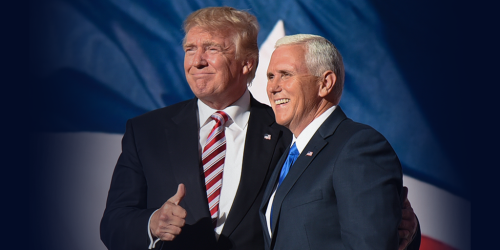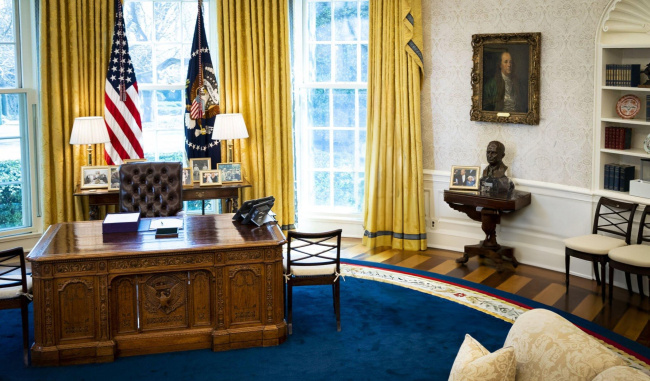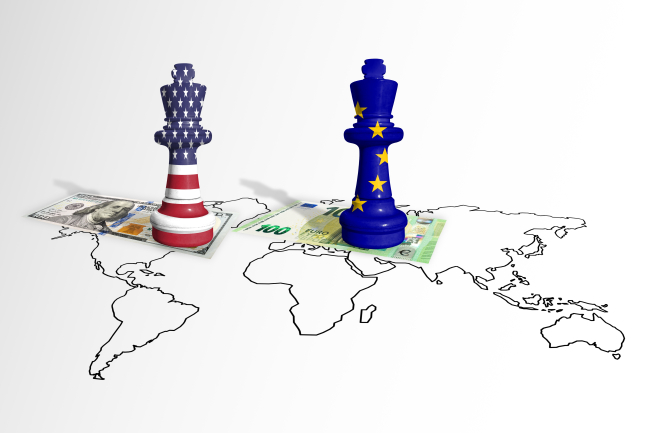Trump's Vice President: Attempting to heal the Republican rift
The announcement of Mike Pence as Republican presidential nominee Donald Trump’s running mate on July 15 was decidedly lackluster, if not downright awkward. Far from his normal persona of self-assurance to the point of hubris, Trump seemed uncomfortable and even nervous throughout, shifting plans and issuing contradictory statements in the days leading up to his running mate’s finalization.
As Pence’s name began to circulate last week, Trump signaled his malaise by insisting that the leaks were not a “final, final decision,” revealing his inability to confidently stick to Pence. Trump cancelled his first joint event with Pence scheduled for Friday, citing a desire to pay tribute to the victims of the attack in Nice, France the day prior; regardless, Trump drew attention back to himself and announced his choice on Friday evening anyway, via Twitter. Insiders reported that Trump sought assurance from advisors that Pence was the man for the job, even as Trump’s campaign fielded a last-minute appeal from New Jersey Governor Chris Christie.
The selection of Pence represents Trump committing himself to the Republican Party and its unification. Alliance building is Trump’s strategy, but drawing in Republicans is risky as it requires shunning others. A polarizing candidate is what Trump feels his campaign needs but comes with the unease of sacrificing his ability to say or do whatever he pleases, Trump’s characteristic trademark.

A staunch conservative
Trump and Pence had no personal or professional relationship prior to an aggressive push for Pence’s candidacy in the past weeks. They appear to have little in common personally and politically. Regardless, Pence has been vigorously auditioning throughout the summer for Trump’s vice presidential pick, attending rallies in his home state of Indiana to promote Trump and attack his rivals.
Pence, who has in the past flirted with the idea of running for president himself, is best known for his political career that began in 2001 when he was elected to represent Indiana in the House of Representatives. He served six terms in Congress, where he sat on the House Foreign Affairs Committee and had a short stint in party leadership, acting as the Republican Conference Chairman. In 2012, Pence left the House to run for governor of Indiana, a position to which he was elected for a four-year term in 2013.
As much as Trump is a Brooklynite, Pence is a Hoosier. He was born and raised in Columbus, Indiana and remained in the state to attend university and later to earn his juris doctor degree at Indiana University. Before his national political career took off, Pence practiced private law and in 1988 and 1990 ran unsuccessfully for Congress. Following his bids for Congress, he became president of the Indiana Policy Review Foundation, a conservative, free-market think tank. In 1994, he began hosting a political radio show which gained him the name recognition in Indiana for his conservative thinking that allowed him to win a vacant Republican seat in the House of Representatives in his 2000 bid.
The impact of a vice president
Pence seemed a surprising pick to many. His crafted persona of a humble and careful Midwesterner seems a stark contrast to Trump’s usual dynamism and ruthlessness. Those who know Pence regard him as a calculated and smooth communicator, but he lacks recognition on the national stage. A recent poll reveals that 88% of Americans do not know Pence or do not have an opinion of him [1].
Yet, this very lack of excitement or reputation gives Trump and his campaign a tremendous opportunity to frame and market Pence to the public in the coming weeks. It also provides Trump’s presumed presidential opponent, Democrat Hillary Clinton, a similar opportunity to brand and pitch her own image of Pence. Whereas, 69% of voters say that running mates will affect their decision “at least some,” whichever party’s message prevails with voters may affect how millions behave come November 8 [1].
How can Pence help Trump?
Though it is too soon to tell how Pence will be received by the general American populace, both campaigns are placing their bets on certain strategies. Trump certainly chose Pence over other favorites, such as former Speaker of the House Newt Gingrich and New Jersey Governor Chris Christie, to make up for tensions with his party and voters alike.
First, Pence can increase Trump’s favor with Republican elites who have remained distant. Though Trump has bashed “the establishment,” he needs party leaders on his side. His weak national campaign needs elites to rally support, and Trump will certainly need a healthy relationship with Capitol Hill if he finds himself in the Oval Office. Trump is certainly betting on Pence to solidify the peace that has eluded him: “It was party unity. I’m an outsider. People I wasn’t necessarily getting along with are loving this pick.”
With his history in the House, Pence has established relationships and is well regarded as a principled conservative. Pence came into the House 15 years ago in the same class as current Speaker of the House Paul Ryan, who happens to be one of Trump’s least enthusiastic supporters. The two were regarded as “conservative warriors” for their ideologically-driven voting records that favored deregulation, reduced spending and free-markets.
Trump is already experiencing positive windfalls in these circles for choosing a consistently conservative running mate. Ryan praised Trump last week, remarking that Pence “comes from the heart of the conservative movement.” Other Republican high-ups including Senate and House Majority Leaders Mitch McConnell and Kevin McCarthy have also signaled their approval. Senator Jeff Flake of Arizona captured the Republican Party’s relief by describing the selection of Pence as the “best choice Donald Trump's made so far.”
Trump is also hoping that Pence will have a similar effect on donors. Because Trump has not relied on typical campaigning tactics (such as paid advertising) and is able to self-fund, his campaign has failed to raise large funds. Many corporations and longtime Republican donors have rebuffed Trump for his inflammatory politics. These donors include David and Charles Koch, billionaire conservative brothers who also oversee networks of hundreds of other donors. The Koch brothers decided to keep themselves and their money out of the 2016 presidential campaign and likened the choice between Clinton and Trump to the choice between “cancer or a heart attack.”
Pence, though, has a positive history with the Koch brothers and other prominent Republican backers; their organization and its dollars helped Pence to push free-market legislation and tax cuts through the Indiana Legislature. Still, neither donors nor powerful networks have announced plans to change their funding strategies.
But, Trump wants voters to focus not on the politics of Pence but on his policy. He said this weekend, “The main reason I picked him was the incredible job he did in Indiana.” Trump is likely attempting to shore up support amongst socially conservative evangelicals that have been skeptical of Trump’s stance on issues such as gay rights and abortion.
Pence is seen as a religious family man with traditional values. One of his most well-remembered lines is, “I am a Christian, a conservative and a Republican, in that order.” He wrote legislation to defund Planned Parenthood and other family planning clinics before such rhetoric was mainstream amongst Republicans.
He also has a fiscally conservative record to brag about. In Congress, Pence opposed spending hikes, such as Medicare expansion. As governor, he passed massive tax cuts. Pence had the good fortune of being governor when the whole nation was recovering economically. Nevertheless, Trump and Pence will cite that, under his administration, unemployment declined by more than three percentage points, and the state has one of the strongest labor force growth rates [2]. Overall, Pence can point to the policy experiences that Trump’s resume lacks, assuaging voters who see Trump as lacking substance.

Available in:
Regions and themes
Share
Download the full analysis
This page contains only a summary of our work. If you would like to have access to all the information from our research on the subject, you can download the full version in PDF format.
Trump's Vice President: Attempting to heal the Republican rift
Related centers and programs
Discover our other research centers and programsFind out more
Discover all our analysesDonald Trump v. the States: the Case of New York
While the disruptive policies of the second Trump administration are being implemented at the federal level and on the international stage, they are also being felt in the federal states and major cities across the country. In the spring of 2025, several cases involving the state and city of New York demonstrate that the president’s attacks on environmental protection, the separation of powers, freedom of speech, etc., are also being carried out at the local level.
How the US under Trump Became a Strategic and Ideological Adversary of Europe
The Europeans' worst security nightmare seems to be coming true: on Tuesday, February 18, 2025, U.S. Secretary of State Marco Rubio and Russian Foreign Minister Sergey Lavrov met in Saudi Arabia to initiate the normalization of relations between their two countries. The meeting also aimed to set up peace negotiations for Ukraine. However, despite having the potential to affect the entire continent, the discussions took place without the Europeans or the Ukrainians being present.
Will Trumpian Authoritarianism Lead to a Constitutional Crisis?
Since his return to the White House on January 20, 2025, President Donald Trump has signed around sixty executive orders to implement his political agenda. Numerous other measures have also been introduced by the White House and the new Department of Government Efficiency (DOGE) as part of these orders.
Trump’s Second Term: Laying the Groundwork for a New Trade War
In a statement released on February 1, 2025, President Trump announced the implementation of a 10% tariff on Chinese goods and a 25% tariff on imports from Canada and Mexico. While the former took effect via executive order on February 4, the latter were granted a 30-day reprieve. Sanctions targeting European Union (EU) products are said to be imminent.








